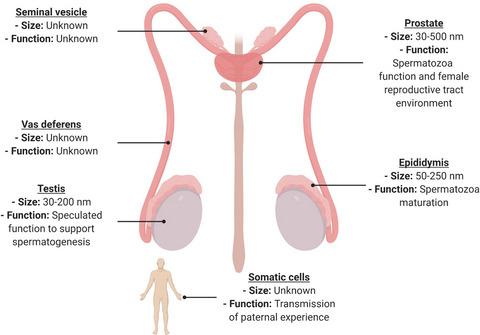当前位置:
X-MOL 学术
›
Am. J. Reprod. Immunol.
›
论文详情
Our official English website, www.x-mol.net, welcomes your
feedback! (Note: you will need to create a separate account there.)
Roles of male reproductive tract extracellular vesicles in reproduction
American Journal of Reproductive Immunology ( IF 2.5 ) Pub Date : 2020-09-03 , DOI: 10.1111/aji.13338 Cottrell T Tamessar 1, 2 , Natalie A Trigg 1, 2 , Brett Nixon 1, 2 , David A Skerrett-Byrne 1, 2 , David J Sharkey 3 , Sarah A Robertson 3 , Elizabeth G Bromfield 1, 2, 4 , John E Schjenken 1, 2, 3
American Journal of Reproductive Immunology ( IF 2.5 ) Pub Date : 2020-09-03 , DOI: 10.1111/aji.13338 Cottrell T Tamessar 1, 2 , Natalie A Trigg 1, 2 , Brett Nixon 1, 2 , David A Skerrett-Byrne 1, 2 , David J Sharkey 3 , Sarah A Robertson 3 , Elizabeth G Bromfield 1, 2, 4 , John E Schjenken 1, 2, 3
Affiliation

|
Extracellular vesicles (EVs) are secreted cell‐derived membrane structures present in all organisms across animal, bacterial, and plant phyla. These vesicles play important roles in cell‐cell communication in many processes integral to health and disease. Recent studies demonstrate that EVs and their cargo have influential and conserved roles in male reproduction. While EVs have been isolated from virtually all specialized tissues comprising the male reproductive tract, they are best characterized in the epididymis (epididymosomes) and seminal fluid (seminal fluid extracellular vesicles or prostasomes). Broadly speaking, EVs promote reproductive success through supporting sperm development and function, as well as influencing the physiology of female reproductive tract cells after mating. In this review, we present current knowledge on the composition and function of male reproductive tract EV populations in both normal physiology and pathology, and argue that their functions identify them as critical regulators of fertility and fecundity.
中文翻译:

雄性生殖道细胞外囊泡在生殖中的作用
细胞外囊泡 (EV) 是存在于动物、细菌和植物门的所有生物体中的分泌细胞衍生膜结构。这些囊泡在许多与健康和疾病相关的过程中的细胞间通讯中发挥着重要作用。最近的研究表明 EV 及其货物在雄性生殖中具有影响和保守的作用。虽然 EV 已从几乎所有包含男性生殖道的专门组织中分离出来,但它们在附睾(附睾体)和精液(精液细胞外囊泡或前列腺小体)中的特征最为明显。从广义上讲,EVs 通过支持精子的发育和功能以及影响交配后女性生殖道细胞的生理机能来促进生殖成功。在这次审查中,
更新日期:2020-09-03
中文翻译:

雄性生殖道细胞外囊泡在生殖中的作用
细胞外囊泡 (EV) 是存在于动物、细菌和植物门的所有生物体中的分泌细胞衍生膜结构。这些囊泡在许多与健康和疾病相关的过程中的细胞间通讯中发挥着重要作用。最近的研究表明 EV 及其货物在雄性生殖中具有影响和保守的作用。虽然 EV 已从几乎所有包含男性生殖道的专门组织中分离出来,但它们在附睾(附睾体)和精液(精液细胞外囊泡或前列腺小体)中的特征最为明显。从广义上讲,EVs 通过支持精子的发育和功能以及影响交配后女性生殖道细胞的生理机能来促进生殖成功。在这次审查中,











































 京公网安备 11010802027423号
京公网安备 11010802027423号